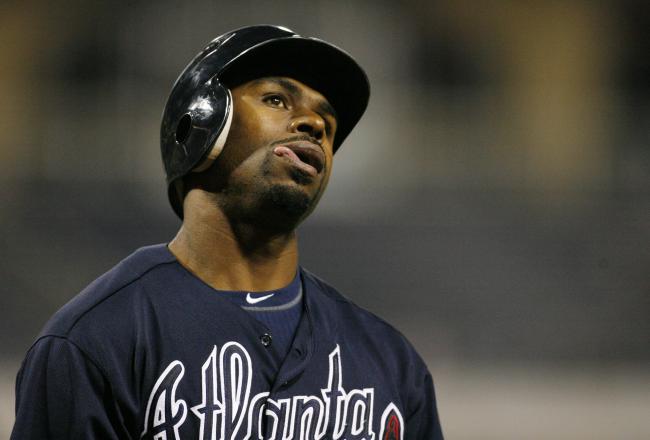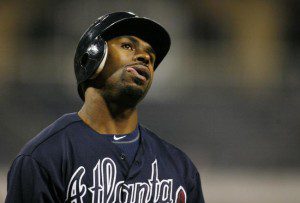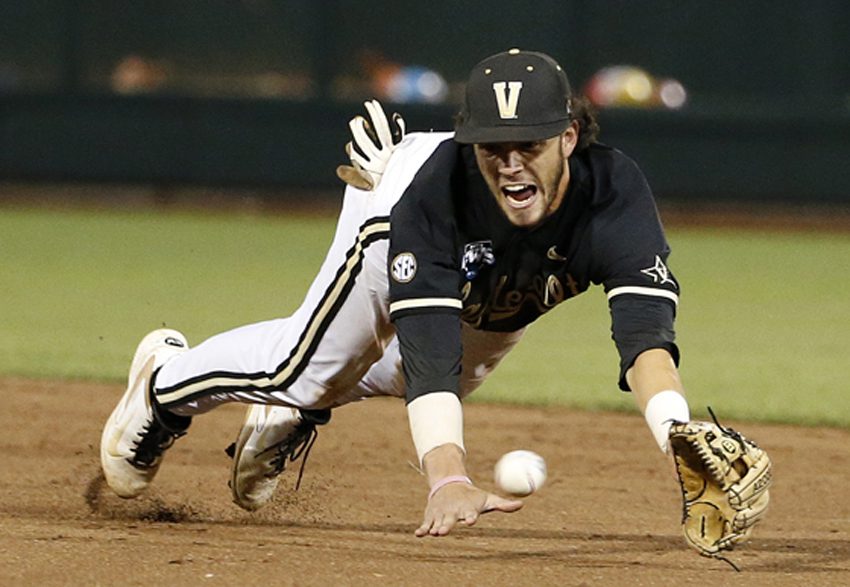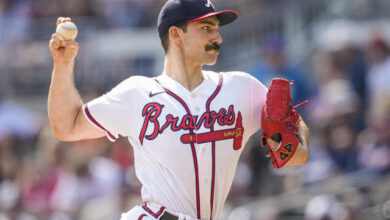

No player has been more enigmatic this offseason than free-agent outfielder Michael Bourn. Making the National League All-Star team twice since 2010, while also leading Major League Baseball in stolen bases in 2011, one would think that Bourn would have found a home by now.
With position players scheduled to report to spring training in a little more than a month, several questions concerning Bourn remain. For instance, why has it been so difficult for Bourn to land a job? How does he compare to players at his position? Finally, where would Bourn realistically fit and why?
First and foremost, the obvious reason Bourn has yet to find a gig has to do with something called draft-pick compensation. As Anthony Witrado reported, Bourn is hitched to draft-pick compensation because he declined a qualifying offer of $13.3 million from the Atlanta Braves. The club that signs Bourn will forfeit its first-round draft pick in next year’s MLB draft while also paying Bourn a salary of extravagant proportions.
Revolutionary changes in MLB’s amateur draft have had unintended consequences, and several players, such as Bourn, are reeling from the side effects. Because of the draft-pick compensation rule, it is plausible that Bourn might not find a home until February, days before spring training opens for position players. Then again, with the breaking news of fellow qualifying offer denier Adam LaRoche coming to terms with the Washington Nationals, the dominoes may begin to fall, and teams may be more prepared to deal with the loss of a first-round draft pick by signing Bourn.
Bourn is clearly an elite base stealer. In 2011, he led the majors in stolen bases. Last season, his 42 swiped bases was second to Mike Trout (49). Following Bourn, within his position, was Ben Revere with 40, and Shane Victorino and Coco Crisp with 39. Since 2008, Bourn has averaged 51.4 stolen bases. Although, Bourn’s 42 steals in 2012 was his lowest total since becoming an everyday player with Houston in 2008 when he tallied 41.
In terms of batting average, Bourn was tied at 27th overall in MLB with Pittsburgh’s Garret Jones with a .274 average in 2012. Only four other outfielders who had 30 or more stolen bases hit for a higher average than Bourn last season. The list includes Trout, Ryan Braun, Revere, and Norichika Aoki.
More importantly, Bourn’s Wins Above Replacement (WAR) was elite in 2012. For those unfamiliar, WAR is simply a metric used to measure a player’s overall contribution to his team in a single season within one statistic. In 2012, Bourn’s WAR of 6.4 was the fifth highest in all of MLB among outfielders. Below is a ranking of the outfielders with the highest WAR:
- Mike Trout (Angels) — 10.0
- Ryan Braun (Brewers) — 7.9
- Andrew McCutchen (Pirates) — 7.4
- Jason Heyward (Braves) — 6.6
- Michael Bourn (Braves) — 6.4
- Martin Prado (Braves) — 5.9
- Ben Zobrist (Rays) — 5.9
- Alex Gordon (Royals) — 5.9
- Austin Jackson (Tigers) — 5.5
- Torii Hunter (Angels) — 5.3
By metric standards, a WAR of 4-5 equates to an all-star caliber player, while 5-6 is usually attributed to a superstar, and 6 or more is most valuable player territory. The question thus remains: Was Bourn’s 2012 performance then MVP worthy? One would imagine that even the biggest Atlanta Braves homer would have a difficult time trying to justify such a position. While Bourn did produce overall with more home runs, RBI and runs than at any point prior up until 2009, his average and stolen bases dipped, and his WAR of 6.4 attained a peak which may never reach again.
As compared to other players within his position, what Bourn lacks in power as compared to Trout, Braun and McCutchen, he makes up for in manufacturing production elsewhere. Then again, at 29 years of age, he may be approaching the downside of a career where he has made money with his legs. The risk and reward of losing a first-round selection for a 29-year-old base stealer, who has never hit better than .294 and may have peaked out, remains a tumultuous subject.
In November, rumors were abound that Bourn was seeking a $100 million contract. Unfortunately, it seems such a deal is unlikely now. While most love that Bourn’s defensive metrics put him on par with the best in baseball, his bat is just good enough to garnish recognition, even when his batting average may be in decline. Therefore, suitors have been hard to come by.
Two clubs have been consistently linked to Bourn this offseason. First up, Atlanta. The Braves are rumored to still be in on Bourn despite the fact they signed former Tampa Bay Rays outsfielder B.J. Upton to a five-year, $75 million deal. Atlanta has a history of being thrifty in terms of contracts given out to ballplayers. While it is plausible, plausibility does not infer reality. Atlanta’s history of being prude will likely win out over bringing Bourn back with a contract that exceeds the $13.3 million qualifying offer Bourn denied at the end of 2012.
On deck is the Texas Rangers. After seeing Josh Hamilton waltz over to the Los Angeles Angels, this club is in dire straits where center field is concerned. What creates the improbability of Texas reaching out to Bourn and handing him a contract worth approximately $15 million annually is they just signed Lance Berkman to a $10 million deal and also have one other player under contract making more than $15 million annually in Adrian Beltre. Texas has also been known to be thrifty in terms of spending.
The New York Mets were also reportedly in the hunt to sign Bourn, but they apparently decided to go in another direction, announcing they will not surrender their 2013 first round pick (11th overall) to sign Bourn.
Seattle’s 2013 projected team salary of $53.4 million puts them in a position where they could possibly spend some money. They do not necessarily need a center fielder with Franklin Gutierrez healthy, but with Gutierrez being injury prone, Bourn could be a wise investment as the Mariners try to become relevant in the AL West. Despite the fact the Mariners are likely to be more competitive with the Astros than with the Angels, Rangers or Athletics, it could bode well to bring in a bat that could potentially manufacture some much needed runs. After all, Seattle has maintained bottom of the barrel status in runs scored over the last few years. This could all be a moot point as the Mariners have reportedly stated they are not looking into signing Bourn. Once again, the draft-pick compensation rule strikes again.
The Chicago Cubs payroll is $80 million less than what it was in 2010. As of now, the Cubs are depending on Brett Jackson succeeding in center field despite the possibility the young prospect might struggle. This franchise is not currently interested in spending money in free agency, but the monetary threshold appears to be abundant when it comes to absorbing a contract like Bourn is seeking. In the eyes of the Cubs, one concern to signing Bourn to a big contract is the risk they’ll get stuck with another Alfonso Soriano-like contract. Even though Bourn’s contract would not be as cumbersome as Soriano’s, if Bourn falters in the Windy City, it will be too reminiscent of the woes that have plagued the Cubs since their big spending years of 2007-2011. The other more important flaw is why would the Cubs forfeit the second overall pick in the 2013 draft? The Cubs signing Bourn is not going to happen.
Bourn will not sit out 2013. So, where is his most likely destination? It is hard to tell due to the asinine draft-pick compensation rule. One would have to think the Rangers will reconsider. As previously mentioned, the Rangers’ spending habits tend to disagree with the notion of signing Bourn to a large contract. According to Baseball Prospectus, the Rangers 2013 payroll is approximately $26 million less than what it was a year ago, so they do have some cushion. On the other hand, their current 2013 payroll of $101.5 million is still the second-highest payroll for the Rangers since 2003 and the fourth highest since 2000.
Finally, Bourn is simply too valuable to ride out free agency this long without a deal in place. At the end of the day, something will have to give. More likely than not, the draft-pick compensation rule will nudge Bourn into accepting an offer that is not as fruitful as he had hoped and, quite possibly, not for as long-term as he would have hoped.
The mystery behind Bourn’s lack of contract agreement has been solved, and it becomes even more murkier for the speedster so long as the draft-pick compensation rule continues to rear its ugly head.





